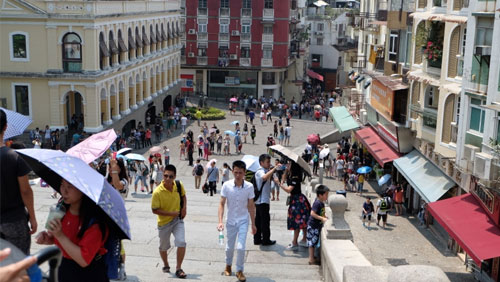Easter is obviously not a major Chinese holiday but, rather, a western one. Despite Chinese tourists accounting for the majority of tourism to Macau, Easter weekend has historically been a popular time for tourists to descend on the gambling enclave. 2018 would prove to be the exception to the rule.
 The four-day holiday period that runs from Good Friday to Easter Monday saw a 4.7% decrease in tourism in Macau compared to the same period last year, GGRAsia reported, quoting data from Public Security Police. Good Friday, Easter Saturday and Easter Monday are considered public holidays in both Macau and its neighbor, Hong Kong. In total, Macau welcomed almost 403,000 tourists during the long weekend. Of those, 74% were Chinese tourists.
The four-day holiday period that runs from Good Friday to Easter Monday saw a 4.7% decrease in tourism in Macau compared to the same period last year, GGRAsia reported, quoting data from Public Security Police. Good Friday, Easter Saturday and Easter Monday are considered public holidays in both Macau and its neighbor, Hong Kong. In total, Macau welcomed almost 403,000 tourists during the long weekend. Of those, 74% were Chinese tourists.
Between March 30 and April 2, border checkpoints logged a total of 1.05 million inbound and outbound movements. The busiest checkpoint was at the Border Gate on the north end of the Macau Peninsula with 753,461 entries and 778,738 exits. The border checkpoint at Outer Harbour received the second highest amount of traffic.
While the Chinese led the tourism rush on the city, they were accompanied by individuals from many other countries. South Korea, Indonesia, Japan and the Philippines were all represented over the weekend. No information regarding percentages of those segments was provided.
The dip in tourism follows the first two months of the year that saw a combined increase of 5.8 million tourists making their way to the city. That was an increase of about 8% over last year’s figures. While casinos always welcome an increase in visitors, the tourists don’t necessarily contribute a substantial amount to their bottom lines. Most of the casino action comes from high rollers, responsible for the majority of the casinos’ take.
Macau casinos got off to a strong start this year, seeing gross gaming revenue (GGR) increase by about 36% over January of last year. The GGR was reported to be around $3.25 billion, 15% higher than most analysts had predicted. January’s revenue was the highest recorded since 2014 when China began to crack down on money laundering and irresponsible spending.
February didn’t perform as well as expected. GGR was increased only 5.7% year-on-year, despite the fact that the Chinese New Year celebrations were held mid-month. It was still a success for the gambling mecca, as it has consecutively increased gambling revenue for the past 19 months.